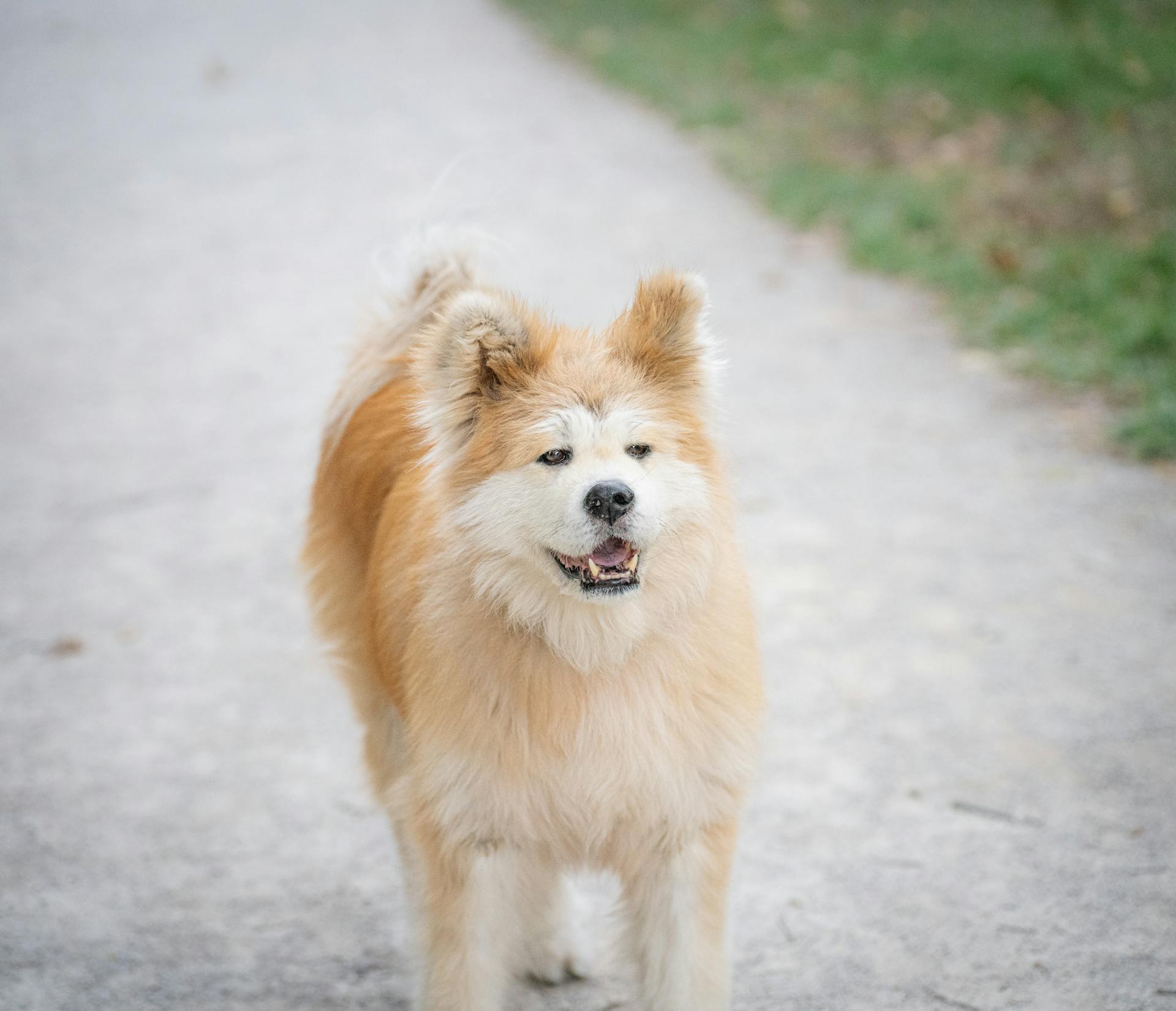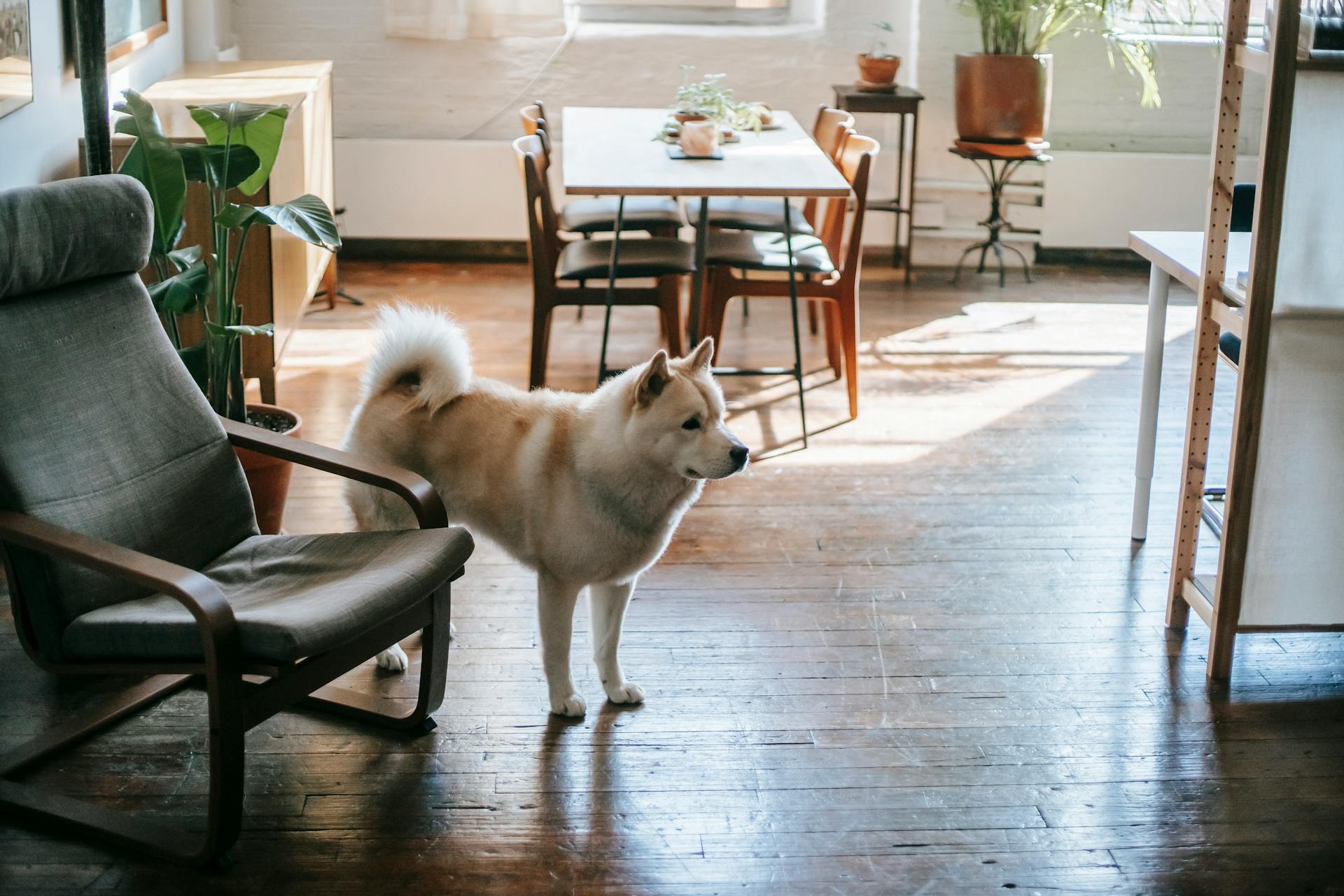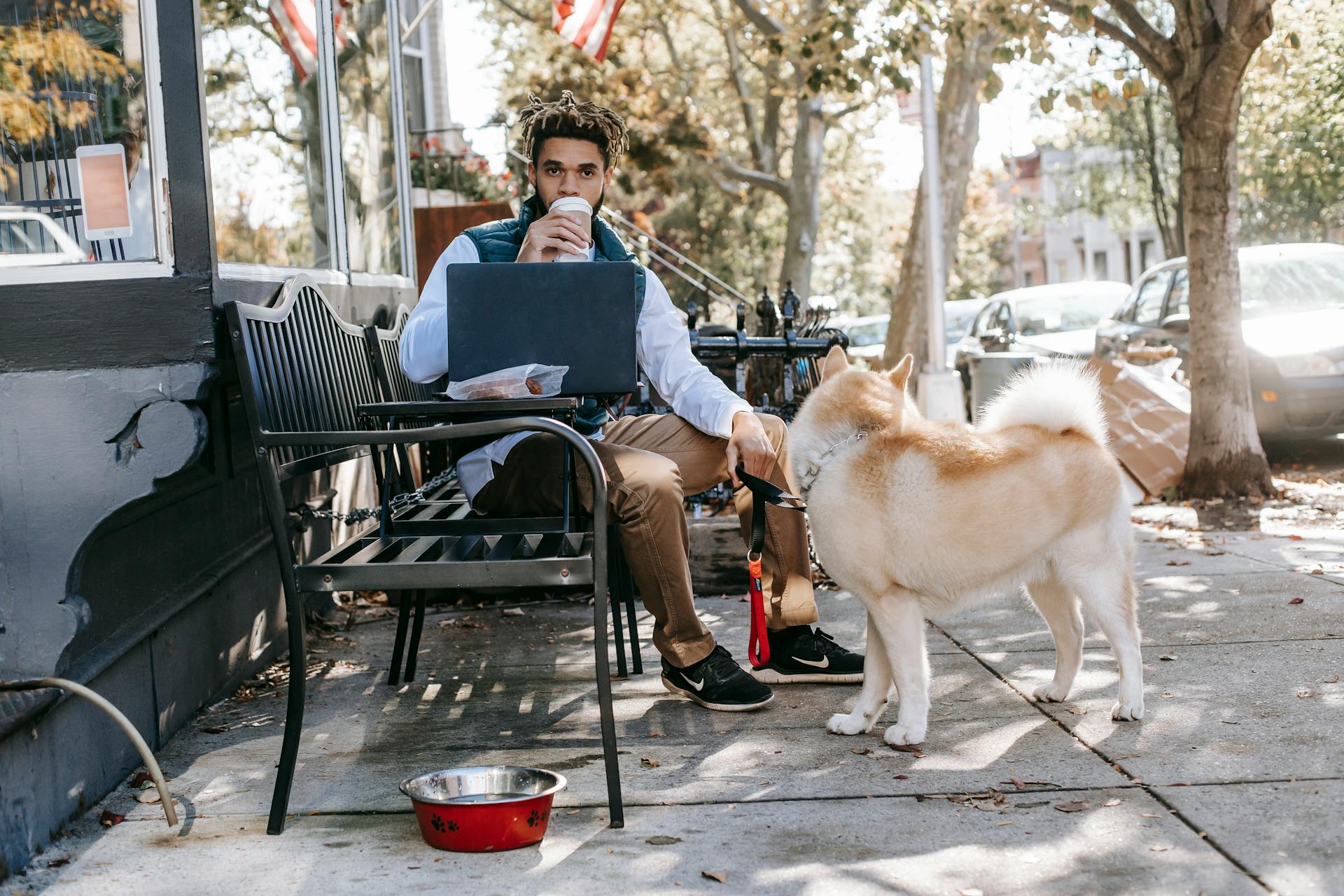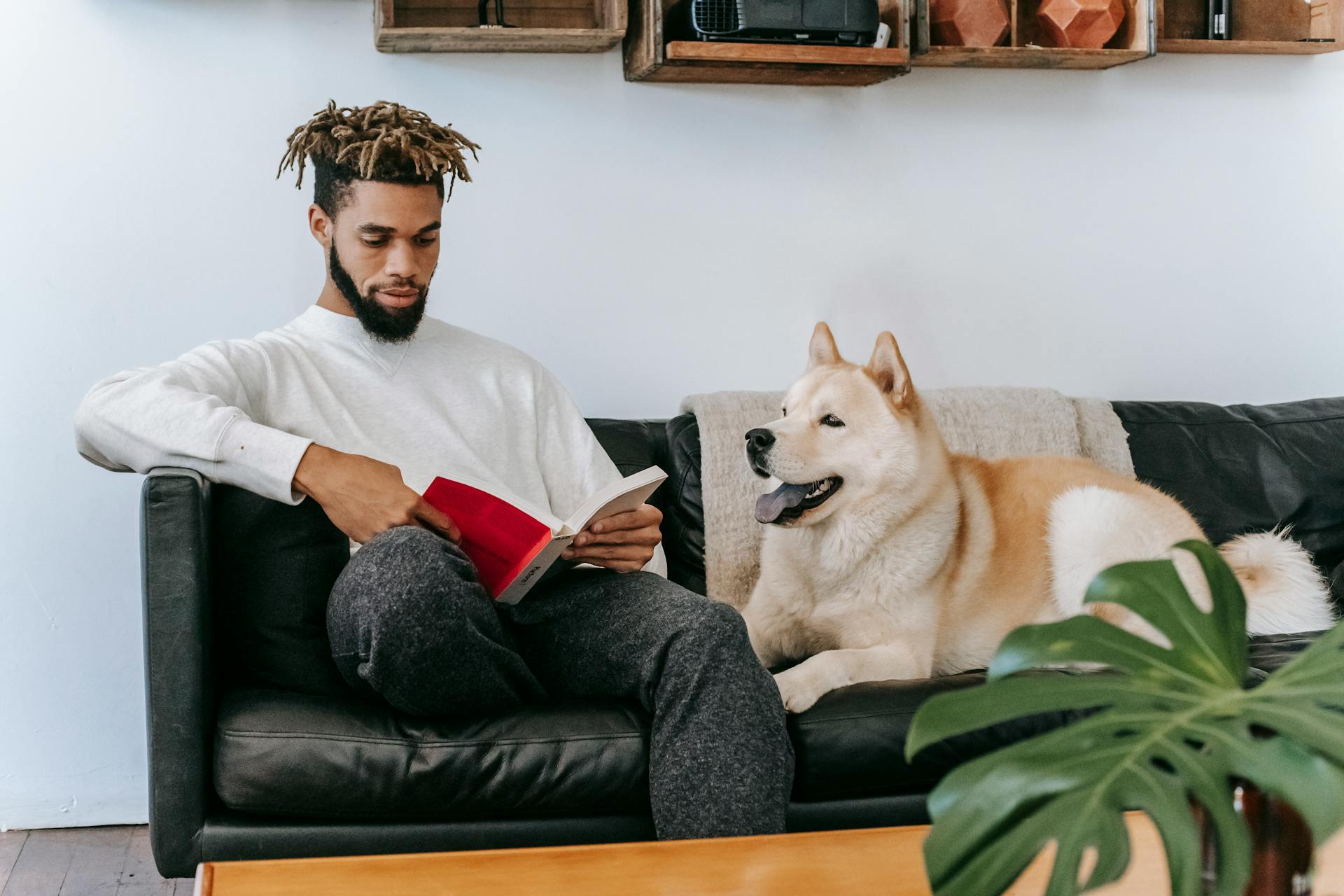
The Akita Inu Chow Chow Mix is a unique and fascinating breed that has gained popularity in recent years. This mix combines the characteristics of two ancient dog breeds, the Akita Inu and the Chow Chow.
The Akita Inu, originating from Japan, is an ancient breed known for its loyalty and protective nature. The Chow Chow, hailing from China, is an ancient dog breed with a distinctive blue-black tongue and a thick, fluffy coat.
As a mix of these two breeds, the Akita Inu Chow Chow Mix inherits the best traits from both parents, including its intelligence, courage, and affectionate nature.
For more insights, see: Corgis Mixed with Other Breeds
Origin and History
The Akita Inu Chow Chow mix has a fascinating origin story. The ancestry of the Akita Chow can be traced back to its parent breeds – the Akita and the Chow Chow.
The Akita breed originated in the mountains of Northern Japan, where they worked as fighting and hunting dogs. They have since been adapted for police and guard work.
The Chow Chow, on the other hand, is one of the oldest living breeds, having originated from Mongolia and Northern China roughly 2,000 years ago. Some sources even date the breed back to 3,000 years ago and Arctic Asia.
The exact origin of the Akita Chow is unknown, but it's believed that someone may have started mixing Akitas with Chows in the 1990s in Northern America.
Appearance and Characteristics
The Akita Inu Chow Chow mix is a stunning breed with a unique appearance. They are large and sturdy, with a muscular build and powerful stance, showcasing their strength and determination.
Their coat is dense and luxurious, with a double coat that effectively protects them from harsh weather conditions. The undercoat is soft and thick, while the outer coat consists of coarser, straighter hairs.
Akita Chows come in an array of colors, including red, black, white, brown, fawn, and silver, with some individuals having a combination of these colors in their coats.
Take a look at this: Akita Inu Colors
Their head is broad and somewhat bear-like, with erect, triangular ears and expressive, dark, almond-shaped eyes. The tail is another distinguishing feature, typically curling over their back in a manner similar to their Akita Inu ancestry.
The height of an Akita Chow typically ranges between 23-25 inches, while their weight can vary between 88-145 pounds, with males generally being larger and heavier than females.
Here's a size comparison for males and females:
Health and Care
The Akita Inu Chow Chow mix is a relatively healthy breed, but like all dogs, they can be prone to certain health issues. They have an average life expectancy of 10 to 12 years.
Regular veterinary checkups are crucial to detect any health concerns early on. Your vet can help you develop a care routine that will keep your dog healthy.
Akita Chows may be prone to Entropion, a condition where the eyelid folds inward, causing the eyelashes to rub against the cornea. This can lead to eye ulcers and other serious problems.
Here's an interesting read: Chow Chow Dog Health Problems
Progressive Retinal Atrophy is another common issue, causing degeneration of the retina and leading to progressive vision loss and eventual blindness. Obesity is also a concern, and can be largely prevented with regular exercise and a healthy diet.
To keep your Akita Chow's coat healthy, brush it three to four times a week to remove loose hairs and prevent matting. Bathe them as frequently as weekly or every 6 weeks, depending on their activity level.
Here are some common health issues to be aware of:
- Entropion
- Progressive Retinal Atrophy
- Obesity
- Hip Dysplasia
Hip Dysplasia is a malformation of the hip joint where the ball and socket don't fit correctly, leading to joint instability and potential degeneration. Regular exercise and a healthy diet can help prevent or manage this condition.
To keep your Akita Chow's nails trimmed, brush their teeth daily, and check their ears regularly for cleanliness and signs of infection. Regular grooming will also help prevent matting and tangling of their coat.
Grooming and Feeding
Grooming your Akita Chow mix requires regular maintenance to keep their thick, double coat healthy and looking its best. Brush their coat three to four times a week to remove loose hairs and prevent matting.
To minimize shedding, increase brushing frequency during shedding seasons. Regular nail trimming, ear cleaning, and dental care are also essential for maintaining overall health.
Akita Chow mixes are relatively low-maintenance when it comes to grooming. They only require a good brush every other day to keep their coats neat and minimize shedding on your furniture. They also don't need coat trimming or regular baths.
Here's a summary of their grooming needs:
- Brush their coat three to four times a week
- Trim their nails every few weeks
- Clean their ears regularly
- Brush their teeth daily
In terms of feeding, Akita Chow mixes need quality food formulated for large dog breeds. Feed them twice daily, serving portions depending on their size, age, metabolism, and activity level. The recommended daily amount is between three to five cups of high-quality dry food per day.
Grooming
Grooming is an essential part of caring for your Akita Chow mix. Their thick, double coat requires regular maintenance to keep it healthy and looking its best.
Brushing their coat three to four times a week is a must to remove loose hairs, prevent matting, and keep their skin healthy. You can use a slicker brush or de-shedding tool for effective brushing.
Their coat sheds seasonally, so be prepared to increase brushing frequency during these times. Regular nail trimming, ear cleaning, and dental care are also essential for maintaining overall health.
Akita Chows are not smelly dogs and don't need bathing more than three to four times a year. However, they do require regular bathing to keep their coat clean and healthy.
Here's a quick rundown of grooming tasks to keep in mind:
- Brush their coat 3-4 times a week
- Trim their nails every few weeks
- Clean their ears regularly
- Brush their teeth daily
- Bathe them every 6 weeks or as needed
By following these grooming tips, you'll be able to keep your Akita Chow mix's coat looking its best and their overall health in top shape.
Feeding
Feeding your Akita Chow requires careful consideration of their large breed size, high energy needs, and individual characteristics.
Stick to a high-quality dog food that's formulated for large breeds and provide two meals a day for optimal nourishment.
Puppies require more frequent meals during their first year to support growth and development, so be prepared to adjust their meal plan accordingly.
Consistency is key, so establish a routine for feeding times to ensure your Akita Chow stays on track.
Remember to always provide fresh water to keep your furry friend well-hydrated.
Be cautious with treats and human food, as overindulgence can lead to obesity and other health issues.
Chakitas, the hybrid breed, are prone to weight issues, so it's essential to maintain a regulated feeding schedule.
Feed your Akita Chow between three to five cups of high-quality dry food per day, depending on their size, age, metabolism, and activity level.
If your Akita Chow inherits the lazy streak of the Chow Chow parent, reduce their food portions accordingly.
Consult with a veterinarian to determine the best diet plan for your Akita Chow, as their individual needs may vary.
Feeding a complete and balanced dry or wet dog food is crucial for your Akita Chow's overall health.
High-quality commercial food or raw food diets can help prevent common health issues, so consider these options with your veterinarian's guidance.
Use a high-quality dog food that's free from preservatives like BHA and contains real meats and vegetables for optimal nutrition.
Follow the package instructions for feeding your Akita Chow, but be prepared to adjust their meal requirements as they age.
Readers also liked: Akita Inu Health Problems
Temperament and Training
The Akita Inu Chow Chow mix is known for its independent and strong-willed nature, making training a bit challenging. They can be stubborn and may not follow instructions immediately.
To train an Akita Chow effectively, it's essential to establish yourself as the pack leader early in the training process. Positive reinforcement techniques, such as rewards and praise, can keep them engaged and motivated during training sessions.
These dogs require proper socialization to prevent aggression towards strangers and other animals. Starting socialization early in their puppyhood is highly recommended, as this will help prevent any undesirable traits from developing.
Temperament & Intelligence
Akita Chow mixes are naturally alert and bold, making them excellent guard dogs. They are fiercely loyal to their family members and can be highly possessive of their owners.
Their independent nature makes them think for themselves and not always follow instructions, which can be both a blessing and a curse. They prefer making decisions independently and don't always follow instructions.
Akita Chows are intelligent but stubborn, which can make training a challenge. They require firm and consistent training to keep their dominant behavior in check.
Socialization plays a significant role in shaping their attitude towards strangers and other animals. They may exhibit an aloof demeanor around unfamiliar people, preferring to assess the situation cautiously before warming up to them.
Akita Chows can be affectionate and loyal family members, but they may also display aggression towards other dogs outside of their family. With proper socialization and training, they can be well-adjusted companions.
A fresh viewpoint: Are Chow Chows Good Guard Dogs
They are not very affectionate and may not like being knocked around by children or sharing their space with other pets. However, they are fiercely loyal and protective of their owners, making them excellent guard dogs.
Akita Chows are best suited for homes with no other pets, as they can get along with other animals but often prefer to be the center of attention. They require proper socialization and training to prevent undesirable traits from developing.
Felines in Personality
Akita Chow mixes have cat-like personalities, which means they're highly independent and not always eager to please their owners. They can be aloof and standoffish, preferring to sit back and observe rather than rushing to greet you.
They're bossy, and your dog expects you to approach and greet their "royal highness". This means you'll need to initiate interactions and earn their attention.
While Akita Chow mixes are affectionate and form tight bonds with their favorite person, they're not typically fond of displays of affection like licking your face. Belly scratches are more likely to get a positive response.
Food incentives can be a great way to get their attention, but it's essential to approach them calmly and respectfully.
Recommended read: Malamute Mixes
Suitable for Families
The Akita Inu Chow Chow mix can be a great companion for families, but it's essential to consider their size and protective instincts. They can be a good fit for families with children, especially if you're willing to invest time in proper socialization and training.
Families with older kids who understand how to interact with a dog are generally a better match for this breed. Young children may not be suitable, as Akita Chows may not tolerate rough play.
Supervising interactions between the dog and children is crucial to prevent mishandling from either party. Teaching children how to approach and touch the dog gently is also vital.
Akita Chows are not known to be playful dogs, so they may not be the best fit for families with young children who are always on the go. However, they can form strong bonds with the family if raised with them from an early age.
If you're considering getting an Akita Chow mix, be prepared for a large commitment - they need at least an hour of exercise and walk time each day. A house with a large yard is ideal, as they need plenty of space to run around.
In terms of other pets, it's best to err on the side of caution and not get them any fur siblings. They would likely prefer to be an only pet, where they can dominate their human parents' attention.
Owning and Caring
Owning and caring for an Akita Inu Chow Chow mix requires a deep understanding of their specific needs. They need regular veterinary checkups to detect any health concerns early.
Their thick, double coat needs regular maintenance, including brushing three to four times a week to remove loose hairs and prevent matting. Utilize a slicker brush or de-shedding tool for effective brushing.
To keep their coat clean and well-groomed, it's essential to remove any dirt, debris, and tangles during brushing. Check their ears regularly for cleanliness and signs of infection.
Their anal glands need to be expressed regularly, which can be done by a vet or groomer. They also require a rigorous exercise schedule, with 60 minutes of walking a day being a good starting point.
Here are some key grooming needs to remember:
- Brush their coat three to four times a week
- Trim their nails every few weeks
- Check their ears regularly for cleanliness and signs of infection
Pets
Owning an Akita Chow means considering their unique needs and personalities. They can be great with older kids, but rough play from young children might not be tolerated.
Supervise all interactions between dogs and young children to prevent mishandling. Teach children how to approach and touch your dog gently and respectfully.
Akita Chows are best kept as solo pets, allowing them to dominate their human parents' attention. They might not get along with other dogs, especially if not raised with them from an early age.
Other household pets can be a challenge for Akita Chows due to their protective nature. They might be aggressive towards other dogs unless properly socialized early in life.
Extensive training and socialization can help an Akita Chow live harmoniously with other pets. However, this is crucial to ensure their well-being and the safety of other animals.
Owning Essentials
Regular veterinary checkups are crucial to detect any health concerns early, so schedule them as often as your vet recommends.
Your Akita Chow's ears need daily checks for debris and pests, and cleaning as directed by your vet. Regular nail trimming, usually once or twice a month, is also essential to prevent clicking against the floor.
Daily tooth brushing is vital to prevent dental issues, which many dogs are prone to. Your vet can show you how to brush your dog's teeth properly.
Exercise is a must for your Akita Chow, with 60 minutes of walking a day being a good starting point. This will help maintain their overall health and well-being.
If your dog starts dragging their bottom or "scooting", they may need their anal glands expressed. This can be done by a vet, groomer, or yourself, but it's not the most pleasant task.
Here are some essential things to consider before bringing an Akita Chow home:
- They can be fierce guard dogs and may not be suitable for families with small children or multiple pets.
- They prefer to be solo pets and may not get along with other dogs.
- They require a lot of space and exercise, making apartments unsuitable.
- They need a firm and consistent handler to train and socialize them properly.
Table: Akita Chow Exercise Requirements
Remember, owning an Akita Chow requires a significant commitment to their care and well-being. With the right knowledge and attention, they can make wonderful companions for the right family.
Typical Cost
The cost of an Akita Chow mix can vary greatly depending on several factors. On average, prices can range from $500 to $2000 or more.
Researching responsible breeders is crucial to ensure you're getting a healthy and well-bred puppy.
Puppies and Lifespan
Finding Akita Chow puppies can be challenging, with prices ranging from $2,500 to $3,000.
Chakita puppies are active but not hyperactive, making them a great fit for families who want a playful companion.
To ensure your Chakita pup grows into a well-behaved adult, consider enrolling them in training as early as 8 weeks old, given their size and energetic nature.
The average lifespan of an Akita Chow is 10-14 years, but due to health conditions, this lifespan may be shorter.
It's essential to research and seek veterinarian care to ensure the health of your dog and potentially extend their lifespan.
Related reading: Lifespan of Chow Chow Dog
Puppies
Finding puppies of certain hybrid breeds, like the Akita Chow, can be challenging and expensive, with prices ranging from $2,500 to $3,000.
Chakita puppies are active but not hyperactive, enjoying energetic play and maintaining this behavior into early adulthood.
Their large size makes training essential, and it's recommended to enroll your pup in training as early as 8 weeks old.
What Is the Lifespan of?
The lifespan of a dog can vary greatly depending on the breed. For example, the Akita Chow has an average life span of 10-14 years.
Health conditions can significantly shorten a dog's lifespan. Given the health conditions the Akita Chow is prone to, its lifespan may be much shorter.
Some breeds are generally longer-lived than others. However, research and proper care can help ensure a long and healthy life for your dog.
Regular veterinarian care and advice are crucial for a dog's health. This is especially important for breeds that are prone to certain health conditions, like the Akita Chow.
Frequently Asked Questions
How big do Akita chows get?
Akita Chows typically weigh between 88-133 pounds and stand 23-25 inches tall. Their size varies depending on their parent breeds.
What is the best breed to mix with an Akita?
There is no single "best" breed to mix with an Akita, as the ideal combination depends on your lifestyle and preferences. Consider popular Akita mixes like the Akita Shepherd, Akita Husky, or Akita Lab for a unique companion.
Featured Images: pexels.com


